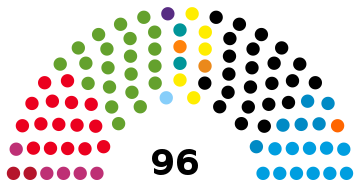Electoral threshold
Since the 2014 European Parliament election, Germany does not have a formal threshold of the vote share required in order for a party to win an EP seat. This has allowed a number of smaller parties to gain representation, since they only have to reach about 0.5% of the vote share needed to get their first seat with the Webster/Sainte-Laguë method.
Although the European Council had recommended that countries with greater than 35 MEPs should introduce a threshold between 2–5%, the German government abandoned its plans for a 2% threshold in November 2018. [1]
This page is based on this
Wikipedia article Text is available under the
CC BY-SA 4.0 license; additional terms may apply.
Images, videos and audio are available under their respective licenses.











